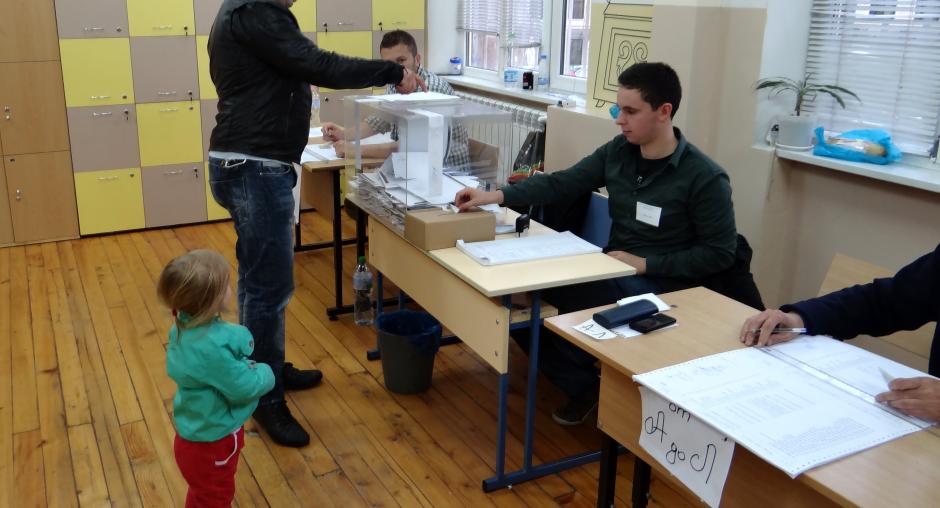Although elections in Bulgaria were well administered, lack of campaign substance and allegations of vote buying continue to harm public confidence, international observers say

SOFIA, 6 October 2014 – Although Bulgaria’s early parliamentary elections on 5 October were well administered technically and fundamental freedoms were respected, allegations from all sides of vote buying and selling and other election irregularities, as well as a campaign that lacked substance continued to negatively affect public confidence in the integrity of the process, international observers said in a statement issued today.
“Yesterday's elections reflected disillusionment and further polarization in Bulgarian society. Despite the goodwill of thousands of citizens in the election administration doing their best to ensure a successful election day, numerous corruption scandals and allegations of vote-buying, combined with a lack of substance in the electoral campaign, undermined public trust in the process and in politics in general," said Doris Fiala, Head of the Delegation from the Parliamentary Assembly of the Council of Europe (PACE). “I encourage the newly-elected political forces to set aside their differences and to tackle together society’s pressing demands.”
Against the backdrop of political crisis, the election environment was characterized by electoral and political fatigue, the observers said. The campaign occasionally became negative and populist, with several parties using racist, xenophobic and inflammatory rhetoric, especially targeting national minorities.
Allegations of vote buying and selling persisted despite a pledge by the authorities to fully enforce existing laws against the practice, and the establishment of an inter-agency task force set up by the Ministry of Internal Affairs, the Prosecutor’s Office and the National Security Agency. Despite more than 300 reports of irregularities prior to election day, only two of these had resulted in prosecutions.
“There were a number of positive changes to the legal framework, and election bodies administered the technical aspects of the process well. At the same time, there was little campaigning on issues and the media showed no interest in reporting on the elections except for in paid coverage,” said Ambassador Audrey Glover, Head of the limited election observation mission sent by the OSCE Office for Democratic Institutions and Human Rights (ODIHR). “Unless these problems, along with the persistent allegations of election irregularities, are effectively addressed, there will continue to be a serious lack of confidence in elections and in current politics in general.”
The new Electoral Code generally provides a sound basis for the conduct of democratic elections. At the same time, it contains certain gaps and ambiguities that hamper the consistent application of the law. A number of recommendations in past reports by ODIHR and the Council of Europe remain unaddressed. One element of the new Code is the introduction of the single-preference vote, which gives voters the opportunity to choose individual candidates from the party lists.
The election administration conducted its work overall in a professional and transparent manner, contributing positively to the openness of the electoral process.
Candidate registration was inclusive, giving voters a wide choice among 18 parties and 7 coalitions with 6,031 candidates competing for 240 seats in the parliament. The national figures for the percentage of women candidates was not made public, and only limited efforts were made to encourage equal opportunity for full participation by women in elections.
The media provided the contestants with a platform to present their views through debates and interviews, as well as in paid advertising. Smaller parties and independent candidates said, however, that the playing field was uneven when it came to access to the media. There was only limited coverage of the campaign in the news, and a lack of investigative and analytical reporting limited the amount of information available to voters.
In the limited number of polling stations and District Tabulation Centres visited by international observers, election day was generally organized in a professional and efficient manner. Several Precinct Election Commissions had difficulties in counting the preference votes and filling out the machine voting protocols. The transparency of the process was limited by the fact that the Central Election Commission and several Tabulation Centres denied access for observers to the input of results data. Preliminary voter turnout was reported as 48.1 per cent.
The international observation mission consists of 41 observers from 25 countries, including 27 long-term observers and experts from ODIHR and 14 parliamentarians and staff from PACE.
For further information contact:
Ivi-Triin Odrats, PACE, + 359 877 673 781 or + 33 6 62 46 29 79, Ivi-Triin.ODRATS@coe.int
Thomas Rymer, OSCE/ODIHR, +359 876 716 894 or +48 609 522 266, thomas.rymer@odihr.pl
